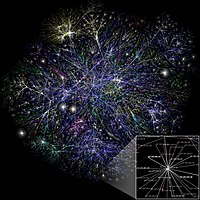
Photo from wikipedia
The quantum approximate optimization algorithm (QAOA) is known for its capability and universality in solving combinatorial optimization problems on near-term quantum devices. The results yielded by QAOA depend strongly on… Click to show full abstract
The quantum approximate optimization algorithm (QAOA) is known for its capability and universality in solving combinatorial optimization problems on near-term quantum devices. The results yielded by QAOA depend strongly on its initial variational parameters. Hence, parameter selection for QAOA becomes an active area of research, as bad initialization might deteriorate the quality of the results, especially at great circuit depths. We first discuss the patterns of optimal parameters in QAOA in two directions: the angle index and the circuit depth. Then, we discuss the symmetries and periodicity of the expectation that is used to determine the bounds of the search space. Based on the patterns in optimal parameters and the bounds restriction, we propose a strategy that predicts the new initial parameters by taking the difference between the previous optimal parameters. Unlike most other strategies, the strategy we propose does not require multiple trials to ensure success. It only requires one prediction when progressing to the next depth. We compare this strategy with our previously proposed strategy and the layerwise strategy for solving the Max-cut problem in terms of the approximation ratio and the optimization cost. We also address the non-optimality in previous parameters, which is seldom discussed in other works despite its importance in explaining the behavior of variational quantum algorithms.
Journal Title: Mathematics
Year Published: 2022
Link to full text (if available)
Share on Social Media: Sign Up to like & get
recommendations!